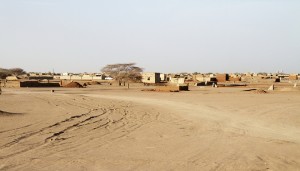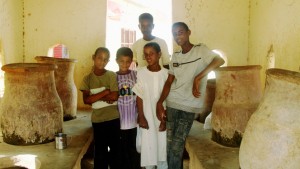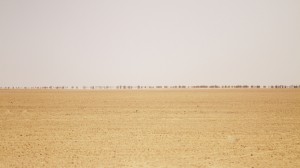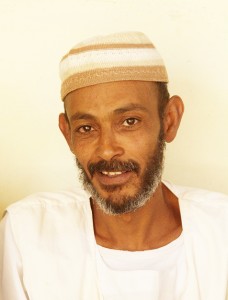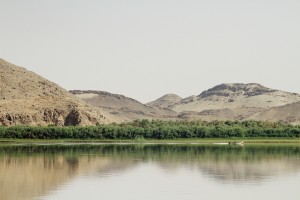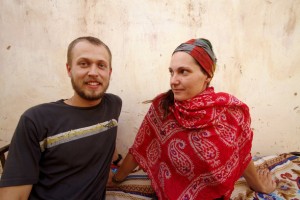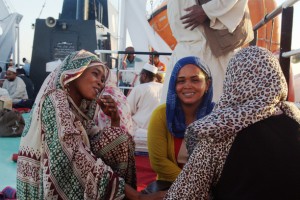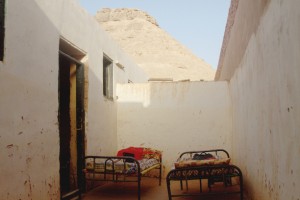The surface of the road is so hot, that it feels like our backpacks are going stick there, and we won’t be able to separate it from the burning stones. If you want to try out how it feels for an egg to be fried, you could sit on the desert rocks in the sun. When we canoed down the Mississipe and were about to complain about the headwind hindering us from the progress, we often reminded ourselves ‘wait in the desert you are going to miss such a feeling’. This is the time when we need such a wind. But wind here is not the one to give you a pleasant feeling. It is a hair dryer straight into your face, and you have no chance whatsover to escape it.
It’s a midday and we are naïve naïve out of the habit to walk the road. We need to, because the border is not the best place to hitch anyways. But half an hour and we need to stop under unexisting shade, and wait for a scarce transport. We are lucky soon to climb on the top of truck load, and move further through the desert, which is wide and long with a few oasis in between, where the cattle is hiding in the shade, and camels filling their tanks for the long term thirst. But don’t expect the wind to any cooler up on the load. On the contrary, its the max level regime of the hair dryer, and the sun tries to get to any uncovered place. There is no surprise, why men here wear white robes and have white caps on top. ‘You need the lighter clothes’ they say to us. ‘We would look like the dirty mops in couple moments, if we wore anything light’ we show.
We soon learn how to cope with ever growing heat. When the sun at its peak they are having a rest on the woven beds, and if there is a pole they would go and hide there even if they need to be smaller than a mouse. The midday hours – it’s time to sleep, play cards, drink coffee (they drink it here spicy. yummy), smoke shisha, but surely not to move hard or work. It gets so hot in Sudan, that even the new tires can burst easily, and the monuments of them lay everywhere alongside the road. The same as the remains of cattle who lost the battle with the automobiles, or tons of rubbish who eventually will cover a good size of desert if nothing will be done. Rwanda seems to have solved the problem – nobody can use plastic but paper bags over there. Otherwise, it would get there as bad as in Sudan. The desert from the road at some point will not look as miraculous as now, because the human traces will cover it sadly and shamefully.
Where can we find a market – come in to us
The driver left us in the fuel station where the sand was still being blown by the hot winds. The sun is about to set down, and we have had breakfast only in the early morning. Where could we get anything? It seems that our habit to have something in the case of emergency evaporated with last drops of water. The fuel station worker couldn’t get the door unlocked, so we desperately hungry left for the town. Gedaref is apparently not that small town, but from the outskirts it looks like a small village. The energy is as low as the sun, but we have to walk to the ‘souk’ (market).
The old man on his simple donkey-drawn carriage urges one tall gentleman, who has just came out from the house to bring us some water. We drank it in one massive sip, as the heat collected all the inside water from us – we do not need to care about the toilet anymore. We were about to move further, but the hosts soon invite us to their tidy property, and make us sit down on one of the beds set in their round-shape windowless house. They soon brought us bread with all sorts of toppings, and we drank tea meanwhile trying to tell about Lithuania to all those who gathered abundantly – grown-ups and kids. They were all very curious to learn who are those strangers. The old man who brought us here drank the first sip of water, spat it suddenly and sharply (a common practice we noticed), and then drank the water and washed his feet for their prayer. The sun is about to set and this is a high time to pray. The happy hosts were observing us as if we were kids who have just learned how to eat and our indipendent progress is enourmous. The beds are put near the rounded walls leaving the middle of the room with a good portion of space. There is a cupboard too, holding some china for the guests to serve with tea. The floor is fine gravel. There are no windows, but a door is letting in the wind in the hot days.
Nobody even thinks of letting us off during the night. They soon put the beds outside, but leaving us a choice to sleep inside in one of those rounded houses. The rain is nonexistant here, and its cooler outside, so yes, we are definetely staying outside. To lay in the bed and observe the stars, to wake up during the night when a neighbour starts singing his morning prayer, to observe the sky is slowly getting brighter, and the birds staring awake too. How can you not feel a part of this universe.
Soon after we lay down in beds, the hosts bring us warm milk and buiscuits – they keep their promise. Half asleep with drink it, and we soon all covered with dreams. The travelers were so right about Sudanese. They simply are very goodhearted people. One Chinese couple even managed to go through it without money. To be honest, we ran out of our local money too, and without an exchange office (but of course, we are in the middle of the desert) thought how we will be able to survive here. But this is exactly why they or we survived. Sudanese live in the desert and they need each other to survive, they know how does it feel to be in hard conditions. They would never thirst, because care about each other and the clay pots are everywhere to provide water to the traveler or a local. It seems that people living in the harsh conditions are closer to each other, as they need to survive let it be cold or heat. But why the press forgets to mention that the goodness to each other may save the people.
The night at the Meroe pyramids
‘I can see the pyramids, I can see them’ we were like kids, trying to fasten the process of arrival to the place. The Meroe pyramids – pharoe tombs – not as huge as in Egypt, and maybe less preserved, but none the less fascinating to see. We unroll our mats, and ready for the night leaving the pyramids to look at us during the twilight. What a feeling when the moon lits them, standing there so gracious and mysterious. When the sun is just up, they look as elegant despite that some of them heavily touched by time and elements. We are there to stay a little bit.
The strange things happen to you while you are in the desert. It has got some magic. The deepest wounds can be unearthed, the darkest feelings like snakes may come up on the surface, but they all being burned down to the ashes and wind blown. Then the nothingness, the peace arrives. It is understandable why so many people go to the desert to search for themselves or God.
Wadi Halfa – the town of men
The little town sits near the entrance to the wide part of Nile. When the dam was open in Egypt, Aswan, Nile got seriously wider, and the old Wadi Halfa was hidden under the water. All the pyramids that were on both sides of the Nile were sent away to the National Museum in Khartoum. It’s a bliss to see the ancient colourful drawings, but it is not the same as it would be to see them graceful where they have been built originally.
Now Wadi Halfa is a gateway to Egypt. The weekly ship comes and goes between Aswan (Egypt) and Wadi Halfa. It has been perhaps the hottest place for us. The day peak can go up to 45-47 degrees, and that is only a spring. No wonder why the town goes to sleep around the midday and only in the evening gets its energy back. In fact, now we are going to compare any temperature with that of Sudan. ‘Oh, it’s only +35, it’s nothing’ we say. If we can survive this, we will survive anything. Now it has been a huge 60 degrees difference in our journey. Freezing in -23 in a tent in Turkey, and roasting in the sunshine of +45 in Sudan. The problem is that even at six in the evening the sun is still hot, and after eight in the morning it is a killing one again, and no one will be able to escape its thorns.
The ship is only on Tuesday, and we arrived on Friday with gold miners. Yes, the northern desert of Sudan keeps the gold deposits, so no wonder why official companies and unofficial individuals here are to sif the rock and dig down deep to get it.
But Wadi Halfa is seriously looking as a town of men. We could count maybe a ten female among good hundreds of men during the entire day. The men here chat, smoke shisha, drink juice (in the countries, where alcohol is forbidden the juice bussiness thrives), sip coffee or tea. We also join the party to drink juice in the morning, and milky tea with fresh doughnuts in the evening. You would say it is a popular place and people should be spoiled by tourists or bypassers. This is not the case in Wadi Halfa. People are as friendly as elsewhere. The officers or hostel owners will invite you to share their meals, the people would drive often you for free, and everyone is not annoingly friendly but opposite – calmly curious and mildly chatty.
The hostel hosts are like characters from animation. The older one is silent, would not look into the eyes, mumbling good good good, but he is just so helpful. He appears unexpectedly when he is the most needed. Maybe sometimes too much. During the first evening, he would come into our room (we did not lock it – the heat would be impossible, and this was the last time sleep inside). Karolis jumps from his sleep, and the host is sitting nearby and offereing him a drink from his plastic bottle. Is that a trap or something? The alcohol is illegal in heavily muslim country. But when the fruit is forbidden there are always secret tunnels to get it. He pours to himself too and drinks it to the bottom, as good russian folk. The bond is made.
The last moments in Sudan. Maybe the desert is not as fascinating (for us it was) as the mountains in Ethiopia or Tanzania, and there is nothing excitingly much to see (but to experience) in Sudan. Anyone (hundred percent) who has been to Sudan would agree that the people are incredibly friendly, you feel safe and good. If you need to ask for something, at least a group of five will join to sort the riddle where to go or where to find a sought after thing. The officers are kind, always greet you with honest warmth, and knowing how beaurocraticly the country still treats the tourists, you are surprised that not all will be law-letter-ridden. We just hope that they would not be spoiled as its neighbour Egypt by abundant tourists, which we do not believe will ever happen. On the other hand, the country has suffered a lot, a long civil war, and the problems are not over yet. Even if the South Sudan has separated already, the western Darfur is still a threat. We sincerely hope they will manage to solve their problems. Often it is not coming from the ordinary people, but ambitious politicians.
Practical advices
Visa and paper work
If you don’t intend spending months in Sudan, two week visa is just right and enough to visit the country, which according to some sources, is actually automatically extended for one month once you are registered, but check it first. In 24 hours it was made in Addis Ababa, Ethiopia costing 100$ (twice for Americans). You have to have Egypt visa for that (30$, three days in Addis Ababa, but two weeks to make for Americans and Canadians). So in less than a week we had our both visas ready.
In Sudan there is lots of paper work, and you can feel it straight from the entrance. You need to go to couple places to be checked and registered. The registration costs again (around 35$). Don’t change the money on the Ethiopian side, they will rip you off, but the rate is so much better on Sudanese part.
Generally you will need the permission to travel and photograph too. It is possible to get it for free in the Ministry of Wildlife and Tourism. It used to be in the downtown, but after we have searched for the place, it seems they changed the location, so we dropped the matter. We have been asked for it only once, but they only collected our name and passport number, and did not say anything else. You should be careful while taking pictures too, particularly of the official building and bridges.We somewhat withheld ourselves until we are in the nature and wise spaces.
Pyramids
There is a fee of 50£ (sudanese) for entrance, but we managed to get a discount paying only 70 for two people (around 13$). We have visited the pyramids in the morning, when it is not hot yet, and we have slept in the desert not too far from them, which was a fascinating experience too.
The ferry Sudan – Egypt
If you are not flying to Egypt, you need to go there by ferry. People in the travel forums say the boat is on Wednesdays, but we embarked on Tuesday, so it is obviously has changed. You would need to come at least one day before the trip. Second class tickets costed us 212 S£, and the travel time is 17 hours. Just after you have bought the tickets, you need to make other papers in order too. In the building behind the ticket office you need to pay 21S£ for the exit, and to stamp some papers. The actual exit stamp you will get later, before boarding the ship.
Just before boarding the ship you will need the cheque for the exit fee, and they will give you a numbered card, which will be necessary to get your final stamp on the passport, and that happens in the port (3-4 km away from Wadi Halfa). There is an office on your right just after you have entered the port, and they will take away the ticket and will give the Egypt arrival card too). The numbers will be called in arabic, but helpful people make sure you will get in time your exit stamp.
The actual getting out of the port into the buses to be brought to the ferry is a bit of a nightmare – is overcrowded and there is no order. After you embarked on the ship, they will collect your passport and will not give back until you reach Egypt. Even then they will be reluctant to give back saying they need to check or something. But thats Egyptian working style – they will smoke, they will wait, and eventually they will work. If everything is in order, dont worry it is only a matter of time.
The ferry is not too huge, and there was around 600 passengers, so you need to find a space to exist and to sleep there. We slept on the deck. The front of the ship at first might look very good place to sleep, but it is separated from others (in our case only white people were aloud there), but it’s pretty windy out there and the sun is harsh in the morning. Besides the rumour was that you need to pay extra for that place, so we left it and located ourselves with locals, and that was a plus – more interesting to chat with locals and not as windy.


